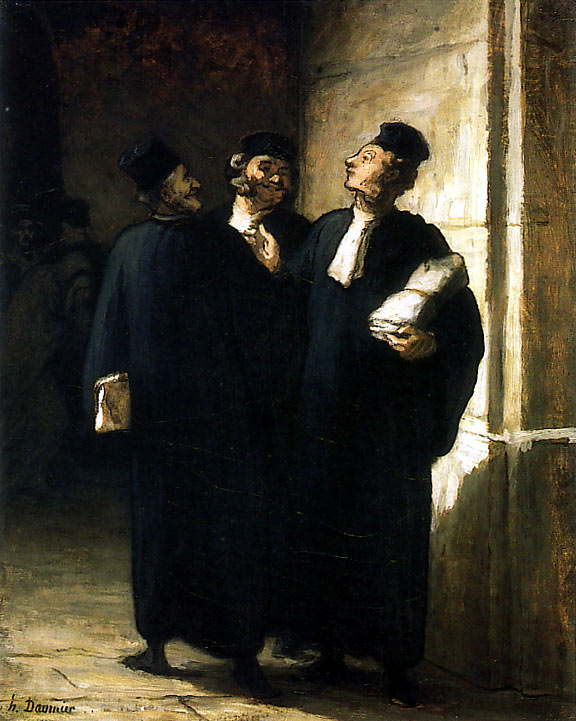« Jack London on Inspiration. | Main | John F. Lynch's "Sitting on the Wall." Or how should Outside Counsel think about GCs and In-house Counsel? »
May 13, 2014
Slick Lawyer Answers to Lazy Lawyer Interrogatories: A Southern District Parable.

"The Lawyers", 1855, Honoré Daumier (1808-1879)
Written discovery practice shouldn't be a joke. But as business trial lawyers, litigators and in-house counsel know, it is a joke too much of the time.
Not that many years ago, in Manhattan's fabled Southern District, a fed-up federal judge had had enough. He threw up his hands during arguments on a motion to compel and referred to answers to interrogatories by one of the two lawyers before him as "slick lawyer answers to lazy lawyer interrogatories".
A wonderful expression. But we do feel his pain. At this blog, we do love, admire and respect written discovery during the pretrial process in American federal courts. If both efficient and creative--and it should be both--written discovery is a way to shorten (not lengthen or extend) the generally unpredictable, expensive discovery process, and get ready for trial on issues that really belong in the case.
In our firm, for a brief period of time, a fundamentally talented second year associate with the makings of a very good trial lawyer worked in our Pittsburgh office, after having spent one year at another firm. One day, he complained to me that we were putting too much thought and effort into a set of interrogatories under Rule 33, Fed. R. Civ. P. So naturally I listened very carefully.
The new hire very patiently, calmly and slowly--so I could digest a great truth he'd discovered--explained to me that the exercise of serving interrogatories and other written discovery upon counsel for plaintiff was a "routine" and primarily "a way for lawyers to bill time so they could make money".
Nothing more, he said.
He was certain and even adamant about it, too. Nice guy, smart guy, and I really liked him--I still do. Shortly after that conversation, he left our firm. Did he quit or get fired? It does not matter. But it was a very good development for our clients and us when he left.
Complex and hard-fought civil cases really do turn in large measure on the quality and honesty of the discovery questions and requests, including deposition questions, and the responses to them. And well-thought out and strategically-timed written discovery is the best way there is to prepare great depositions--and get ready for trial.
Posted by JD Hull at May 13, 2014 12:02 AM
Comments
Post a comment
Thanks for signing in, . Now you can comment. (sign out)
(If you haven't left a comment here before, you may need to be approved by the site owner before your comment will appear. Until then, it won't appear on the entry. Thanks for waiting.)